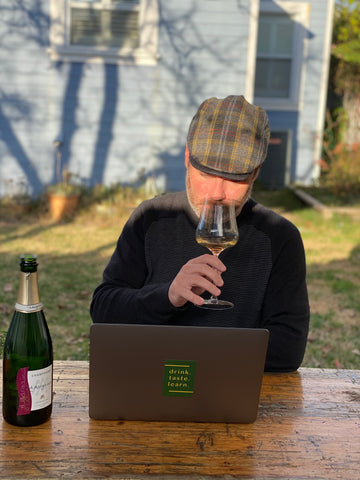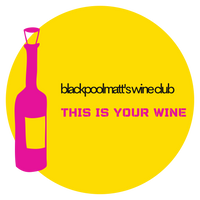how do we talk about wine?

A few years ago, I was working at a wine shop and a colleague had to write a tasting note for a Châteauneuf-du-Pape we had just got into the shop. Trouble was, none of us had actually tasted the wine. Without wanting to invent a tasting note, my colleague instead used one written by a fairly well-known wine critic. The tasting note began with a verbless statement: "Lurid ruby in appearance."
That was an interesting start to the note as lurid has no positive connotations at all; the dictionary definitions include "glaringly bright," "melodramatically sensational," "gloomily threatening," "pale or wan," and "ghastly." Not an adjective I'd choose in a positive review of a $50+ Châteauneuf-du-Pape, yet it was used by a prominent writer and we had the note on display in the shop for months.
I was reminded of this recently when I was reading the description of a wine on the producer's website. Coincidentally, it was a big, high-alcohol Rhône style blend. The tasting note on the site is typical of the overly florid language used to make a wine sound more interesting than its rivals. One phrase stood out: "soft, lacy tannins flesh out the palate." This is one of those descriptions that sounds vaguely impressive but which means absolutely nothing: when does anyone compare any food or drink to lace?
One of the aims of blackpoolmatt's wine club is to make wine as approachable as possible. The only thing that matters about wine is whether you like it or not: no one else can replicate your taste buds. At the same time, we need a common language so we can share our experiences and appreciation of a wine. That way, I know why you like a wine or why you don't, and I can recommend wines that suit your tastes.
Wine should not be intimidating; it is, after all, simply a drink that is wonderfully diverse, expressive, and fascinating. The complexity of wine leads writers and consumers to search for words which reflect that complexity, but sometimes to the point where those words are meaningless or plain wrong. So how do we best talk about wine?
First of all, keep the language simple. Bringing in words like lurid isn't just wrong, it's also not necessary. The wine's red. Move on.
Second, what you smell and taste is what you smell and taste. Don't worry about being right or wrong; let your senses speak for themselves.
Now, of course, it's more complicated than that. Describing a Cabernet Sauvignon as having aromas of pears and green apples would be weird. This is where tasting experience comes in, so you learn how to identify specific aromas. Neverthless, it's still your nose and your palate and no one else's.
In the tech sheets I provide for blackpoolmatt's wine club, I don't actually describe the wines’ aromas that much. That's because it's for you to decide what you appreciate about the wine, using your senses and your language.
Wine should be a joyful experience. It's one that's extremely personal, because it's all about your reactions to and appreciation of the wine. But it's also a shared experience, enjoying the wine with friends and family.
This mixture of personal and social is how we should talk about wine—in a manner that's meaningful to yourself and to the people you're talking to. If the language you use makes no sense to you, then it won't make sense to anyone else.
Unfortunately, a lot of the language used in describing wine is an effort in showmanship. Don't overcomplicate wine: describe it for what it is. And enjoy it. Because this is your wine.
